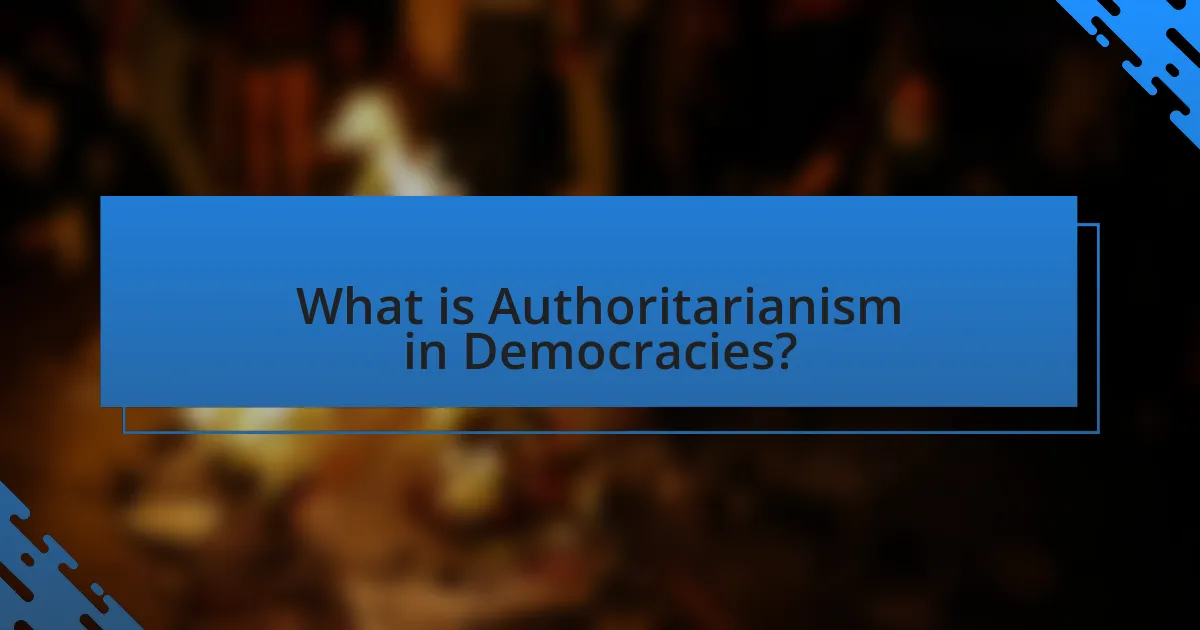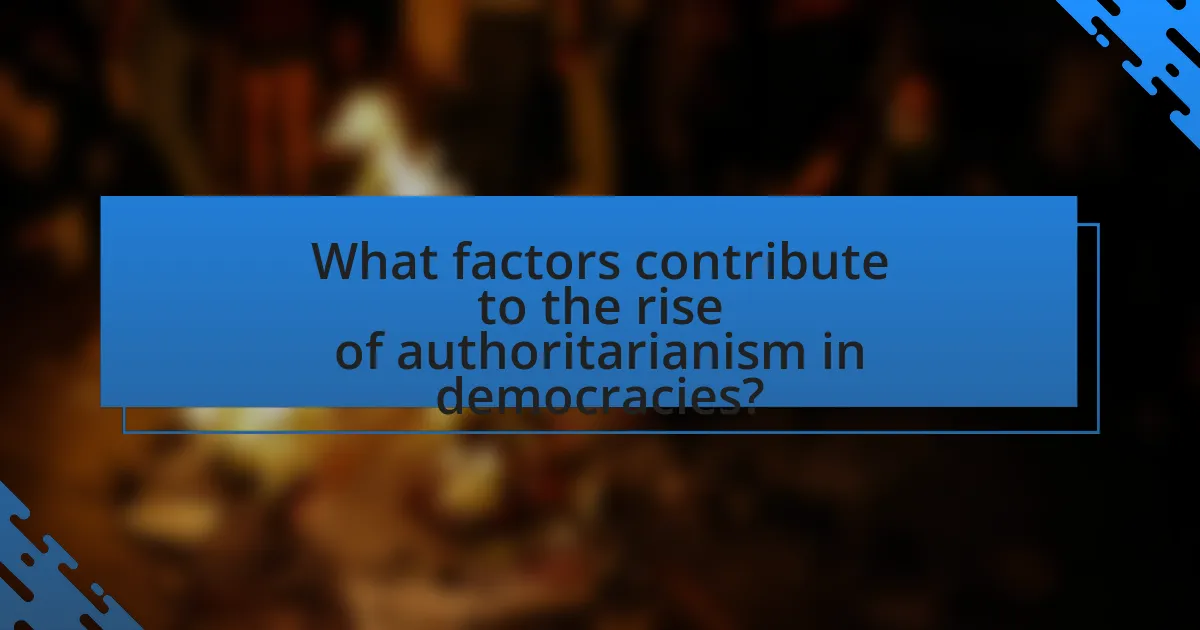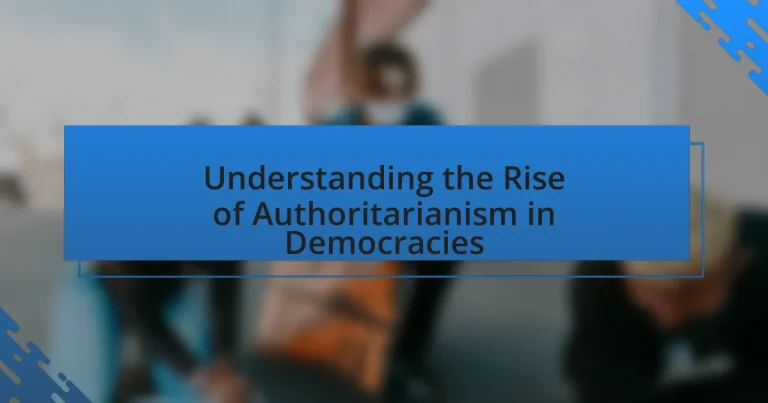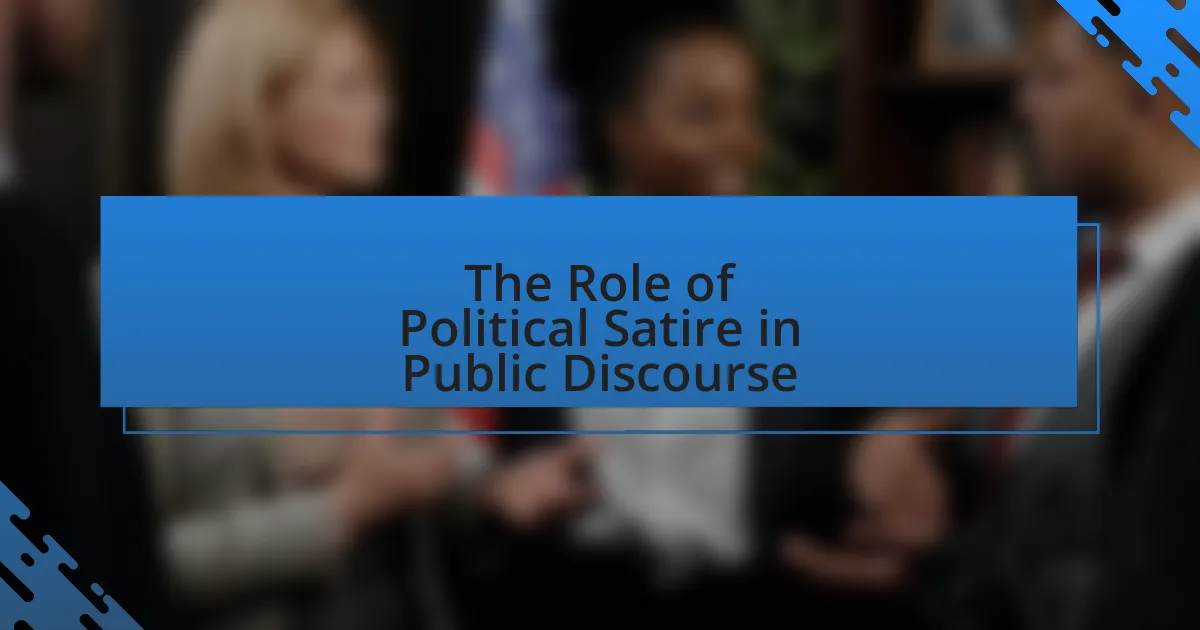Authoritarianism in democracies refers to the gradual erosion of democratic principles and institutions, where elected leaders consolidate power by undermining checks and balances. This article explores how authoritarianism manifests within democratic systems, highlighting key characteristics such as the suppression of dissent, manipulation of electoral processes, and the concentration of power. It examines historical examples, including Hungary and Turkey, to illustrate the implications of authoritarian practices on civil liberties and democratic governance. Additionally, the article discusses the factors contributing to the rise of authoritarianism, including political polarization, economic instability, and social dynamics, while emphasizing the importance of understanding these trends to safeguard democracy.

What is Authoritarianism in Democracies?
Authoritarianism in democracies refers to the erosion of democratic principles and institutions, where elected leaders undermine checks and balances to consolidate power. This phenomenon often manifests through the suppression of dissent, manipulation of electoral processes, and curtailment of civil liberties. Historical examples include Hungary under Viktor Orbán, where constitutional changes have centralized authority, and Turkey under Recep Tayyip Erdoğan, where media freedom has been significantly restricted. These instances illustrate how democratically elected officials can adopt authoritarian practices, leading to a decline in democratic governance.
How does authoritarianism manifest within democratic systems?
Authoritarianism manifests within democratic systems through the erosion of civil liberties, manipulation of electoral processes, and concentration of power in the executive branch. For instance, leaders may undermine judicial independence and restrict media freedom, which diminishes checks and balances essential for democracy. Historical examples include Hungary, where Prime Minister Viktor Orbán has implemented constitutional changes that centralize authority and weaken opposition, demonstrating how democratic frameworks can be exploited to entrench authoritarian rule.
What are the key characteristics of authoritarianism in democracies?
Key characteristics of authoritarianism in democracies include the concentration of power, erosion of civil liberties, manipulation of electoral processes, and suppression of dissent. Concentration of power occurs when political leaders undermine checks and balances, often centralizing authority in the executive branch. Erosion of civil liberties is evident through restrictions on freedom of speech, press, and assembly, which are essential in democratic societies. Manipulation of electoral processes can be seen in practices such as gerrymandering, voter suppression, and the use of state resources for political gain, undermining fair competition. Suppression of dissent manifests through intimidation, harassment, or imprisonment of opposition figures and activists, which stifles public discourse and dissenting opinions. These characteristics have been observed in various democracies, such as Hungary and Turkey, where leaders have increasingly adopted authoritarian practices while maintaining a façade of democratic governance.
How does authoritarianism differ from traditional authoritarian regimes?
Authoritarianism differs from traditional authoritarian regimes primarily in its adaptability and the use of modern technology for control. While traditional authoritarian regimes often rely on overt repression and centralized power structures, contemporary authoritarianism employs more nuanced strategies, including the manipulation of democratic processes and the use of digital surveillance to monitor and suppress dissent. For instance, countries like China exemplify this shift by integrating state control with market reforms and utilizing social media for propaganda, contrasting with the rigid, often militaristic approaches of past regimes. This evolution reflects a broader trend where authoritarian leaders can maintain power while presenting a facade of legitimacy, thereby complicating the distinction between democracy and authoritarianism.
Why is understanding the rise of authoritarianism important?
Understanding the rise of authoritarianism is important because it helps identify threats to democratic institutions and civil liberties. Authoritarian regimes often undermine the rule of law, restrict freedom of speech, and manipulate electoral processes, which can lead to widespread human rights violations. Historical examples, such as the rise of fascism in the 20th century, illustrate how unchecked authoritarianism can result in devastating consequences, including war and genocide. By studying these patterns, societies can develop strategies to safeguard democracy and promote accountability, ensuring that power remains in the hands of the people.
What implications does authoritarianism have for democratic institutions?
Authoritarianism undermines democratic institutions by eroding civil liberties, restricting political pluralism, and concentrating power in the hands of a few. This concentration of power often leads to the suppression of dissent, manipulation of electoral processes, and the weakening of checks and balances, which are essential for a functioning democracy. For instance, countries like Hungary and Turkey have experienced significant democratic backsliding, where authoritarian leaders have curtailed media freedom and marginalized opposition parties, thereby destabilizing the democratic framework. Such actions not only diminish public trust in democratic processes but also create an environment where authoritarian practices can flourish, further entrenching the erosion of democratic norms.
How does authoritarianism affect civil liberties and human rights?
Authoritarianism significantly restricts civil liberties and human rights by concentrating power in the hands of a few, often leading to the suppression of dissent and the curtailment of freedoms such as speech, assembly, and press. In authoritarian regimes, laws and policies are frequently enacted to limit individual rights, exemplified by the use of censorship, surveillance, and arbitrary detention. For instance, according to the Freedom House report, countries classified as “not free” experience widespread violations of political rights and civil liberties, with many citizens facing persecution for opposing the government. This systematic erosion of rights undermines democratic principles and fosters an environment where human rights abuses can occur with impunity.

What factors contribute to the rise of authoritarianism in democracies?
The rise of authoritarianism in democracies is primarily driven by political polarization, economic instability, and the erosion of democratic norms. Political polarization creates an environment where extreme views gain traction, leading to the delegitimization of opposition and increased support for authoritarian leaders who promise stability. Economic instability, characterized by high unemployment and inequality, often results in public discontent, making authoritarian solutions more appealing as citizens seek quick fixes to their problems. The erosion of democratic norms, such as respect for the rule of law and media freedom, further facilitates authoritarianism by undermining checks and balances that protect democratic governance. Historical examples include the rise of authoritarian regimes in Venezuela and Hungary, where economic crises and political divisions have significantly contributed to the consolidation of power by authoritarian leaders.
How do economic conditions influence authoritarianism?
Economic conditions significantly influence authoritarianism by creating environments where citizens may prioritize stability and security over democratic freedoms. In times of economic distress, such as high unemployment or inflation, populations often become disillusioned with democratic governance, leading them to support authoritarian leaders who promise quick solutions and stability. Historical examples include the rise of Adolf Hitler during the Great Depression in Germany, where economic turmoil facilitated the acceptance of authoritarian rule as citizens sought immediate relief from their hardships. Additionally, research indicates that economic inequality can exacerbate social tensions, making authoritarian regimes more appealing as they often exploit these divisions to consolidate power.
What role does economic inequality play in fostering authoritarianism?
Economic inequality significantly contributes to the rise of authoritarianism by creating social divisions and undermining democratic institutions. When wealth is concentrated in the hands of a few, it often leads to political disenfranchisement among the majority, fostering resentment and instability. Research indicates that countries with high levels of economic inequality, such as Brazil and the United States, have experienced increased support for authoritarian leaders who promise to restore order and address grievances. Furthermore, economic disparities can weaken civil society and reduce political participation, making it easier for authoritarian regimes to consolidate power. Studies show that in nations where economic inequality is pronounced, citizens are more likely to accept authoritarian measures as a means to achieve stability and security.
How do economic crises lead to increased authoritarian tendencies?
Economic crises lead to increased authoritarian tendencies by creating social instability and eroding trust in democratic institutions. During economic downturns, high unemployment and declining living standards often result in public discontent, which can make authoritarian solutions appear more appealing. For instance, the global financial crisis of 2008 saw a rise in populist and authoritarian leaders in various countries, as citizens sought strong leadership to address their grievances. Additionally, economic crises can weaken the rule of law and civil liberties, as governments may implement emergency measures that curtail freedoms in the name of stability. Historical examples, such as the rise of authoritarian regimes in Latin America during the debt crises of the 1980s, illustrate how economic hardship can facilitate the consolidation of power by undemocratic leaders.
What social and cultural factors are involved?
Social and cultural factors involved in the rise of authoritarianism in democracies include economic inequality, social polarization, and cultural identity crises. Economic inequality can lead to disillusionment with democratic institutions, as marginalized groups may feel neglected, fostering support for authoritarian leaders who promise stability and order. Social polarization, often exacerbated by partisan media and social networks, creates an environment where opposing views are demonized, making authoritarian rhetoric appealing to those seeking a strongman solution. Cultural identity crises arise when rapid globalization challenges traditional values, prompting some groups to embrace authoritarianism as a means of preserving their cultural identity. These factors collectively contribute to the erosion of democratic norms and the acceptance of authoritarian governance.
How does nationalism contribute to the rise of authoritarianism?
Nationalism contributes to the rise of authoritarianism by fostering a sense of unity and identity that can be exploited by leaders to consolidate power. This phenomenon often occurs when leaders invoke national and a perceived threat from external forces, leading to the justification of authoritarian measures as necessary for national security. Historical examples include the rise of fascist regimes in Europe during the early 20th century, where leaders like Mussolini and Hitler used nationalist rhetoric to rally support and suppress dissent. Additionally, contemporary cases such as Hungary under Viktor Orbán illustrate how nationalism can be leveraged to undermine democratic institutions and centralize authority, as seen in the erosion of judicial independence and media freedom.
What impact does misinformation and media control have on public perception?
Misinformation and media control significantly distort public perception by shaping beliefs and attitudes based on false or manipulated information. Research indicates that exposure to misinformation can lead to increased polarization, where individuals become more entrenched in their views, often aligning with the narratives promoted by controlled media outlets. For instance, a study published in the journal “Science” by Lewandowsky et al. (2012) found that misinformation can persist even after being debunked, influencing public opinion and behavior long-term. Furthermore, media control can suppress dissenting voices, creating an environment where only certain viewpoints are visible, which further skews public understanding and acceptance of reality. This manipulation of information plays a crucial role in the rise of authoritarianism, as it undermines democratic discourse and fosters an uninformed electorate.

How do political dynamics facilitate authoritarianism in democracies?
Political dynamics facilitate authoritarianism in democracies by enabling leaders to exploit institutional weaknesses and public discontent. For instance, during economic crises, leaders may consolidate power by undermining checks and balances, as seen in Hungary under Viktor Orbán, where constitutional changes allowed for increased executive control. Additionally, polarization within political parties can lead to the erosion of democratic norms, as factions prioritize power over governance, exemplified by the rise of populist movements that challenge established democratic frameworks. These dynamics create an environment where authoritarian practices can thrive, often justified by claims of national security or public order.
What role do political parties play in the rise of authoritarianism?
Political parties can facilitate the rise of authoritarianism by consolidating power, undermining democratic institutions, and fostering divisive ideologies. When political parties prioritize their interests over democratic principles, they may engage in practices such as manipulating electoral processes, suppressing dissent, and marginalizing opposition groups. For instance, in countries like Hungary and Turkey, ruling parties have enacted laws that limit media freedom and weaken judicial independence, effectively dismantling checks and balances. This erosion of democratic norms often leads to increased centralization of power, enabling authoritarian leaders to maintain control and suppress opposition.
How can populist movements lead to authoritarian governance?
Populist movements can lead to authoritarian governance by undermining democratic institutions and concentrating power in the hands of a single leader or party. These movements often capitalize on public discontent, portraying themselves as the voice of the “true people” against a corrupt elite, which can erode trust in established political systems. For instance, leaders like Hugo Chávez in Venezuela and Viktor Orbán in Hungary have utilized populist rhetoric to justify the centralization of authority, bypassing checks and balances. This trend is supported by research indicating that populism frequently correlates with democratic backsliding, as seen in various case studies where populist leaders have curtailed media freedoms and weakened judicial independence to consolidate their power.
What strategies do political leaders use to consolidate power?
Political leaders consolidate power through strategies such as manipulating legal frameworks, controlling media narratives, and suppressing dissent. For instance, leaders may enact laws that extend their term limits or weaken checks and balances, as seen in countries like Hungary under Viktor Orbán, where constitutional changes have facilitated the concentration of power. Additionally, controlling media allows leaders to shape public perception and limit opposition voices, exemplified by the state-controlled media in Russia under Vladimir Putin. Furthermore, the use of state security forces to intimidate or eliminate political rivals is a common tactic, as demonstrated in various authoritarian regimes where dissent is met with repression. These strategies collectively enable leaders to maintain and strengthen their grip on power, often at the expense of democratic institutions and civil liberties.
How does the erosion of democratic norms occur?
The erosion of democratic norms occurs through the gradual undermining of institutions, practices, and values that support democracy. This process can manifest in various ways, including the concentration of power in the executive branch, the weakening of judicial independence, and the suppression of free press and civil society. Historical examples, such as the rise of authoritarian regimes in Hungary and Turkey, illustrate how leaders can exploit crises to justify the curtailment of democratic freedoms, thereby eroding public trust in democratic processes and institutions. Additionally, the normalization of anti-democratic rhetoric and actions can desensitize the public to violations of democratic norms, further facilitating their decline.
What are the warning signs of democratic backsliding?
Warning signs of democratic backsliding include the erosion of civil liberties, the undermining of judicial independence, and the restriction of media freedom. Erosion of civil liberties manifests through increased surveillance, suppression of protests, and limitations on freedom of speech, as seen in countries like Hungary and Poland. Undermining judicial independence occurs when political leaders exert influence over courts, compromising their impartiality, which has been documented in Turkey under President Erdoğan. Restrictions on media freedom involve the closure of independent news outlets and harassment of journalists, evident in nations such as Venezuela and Belarus. These indicators collectively signal a shift away from democratic norms and towards authoritarian governance.
How do institutions respond to threats from authoritarianism?
Institutions respond to threats from authoritarianism by reinforcing democratic norms, enhancing accountability mechanisms, and promoting civic engagement. For instance, judicial systems may strengthen their independence to safeguard against political interference, while legislative bodies can enact laws that protect civil liberties. Additionally, institutions often collaborate with civil society organizations to mobilize public awareness and resistance against authoritarian practices. Historical examples include the role of the judiciary in upholding constitutional rights during the rise of authoritarian regimes in countries like Hungary and Poland, where courts have challenged government overreach. These responses are crucial for maintaining democratic integrity and preventing the erosion of freedoms.
What can be done to counter the rise of authoritarianism?
To counter the rise of authoritarianism, strengthening democratic institutions and promoting civic engagement are essential. Democratic institutions, such as an independent judiciary and free press, provide checks on power and ensure accountability. For instance, countries with robust judicial systems, like Germany, have shown resilience against authoritarian tendencies. Additionally, fostering civic engagement through education and grassroots movements empowers citizens to participate actively in governance, as seen in the successful mobilization of civil society in Eastern Europe during the post-Soviet era. These strategies collectively enhance democratic resilience and mitigate the risks of authoritarianism.
What strategies can civil society employ to defend democracy?
Civil society can employ strategies such as advocacy, education, and coalition-building to defend democracy. Advocacy involves mobilizing citizens to engage in political processes, influencing policy decisions, and holding governments accountable. Education initiatives can raise awareness about democratic principles and the dangers of authoritarianism, empowering individuals to recognize and resist threats to democracy. Coalition-building among diverse groups strengthens collective action, enabling civil society to present a united front against authoritarian practices. Historical examples, such as the role of civil society in the fall of authoritarian regimes in Eastern Europe during the late 20th century, demonstrate the effectiveness of these strategies in promoting democratic resilience.
How can international cooperation help combat authoritarianism?
International cooperation can help combat authoritarianism by fostering collective action and promoting democratic values among nations. When countries collaborate, they can share resources, intelligence, and strategies to support democratic movements and counter authoritarian regimes. For instance, the Global Democracy Coalition, which includes various nations and organizations, works to strengthen democratic institutions and provide support to civil society in authoritarian contexts. This cooperation can lead to coordinated sanctions against oppressive governments, as seen in the international response to the Belarusian regime after the 2020 elections, where multiple countries imposed sanctions to pressure the government for democratic reforms. Such unified efforts can deter authoritarian practices and encourage a global commitment to uphold human rights and democratic governance.
What are the best practices for safeguarding democracy?
The best practices for safeguarding democracy include ensuring free and fair elections, protecting civil liberties, promoting transparency in government, and fostering civic engagement. Free and fair elections are fundamental, as they allow citizens to choose their representatives and hold them accountable; for instance, the Organization for Security and Co-operation in Europe (OSCE) monitors elections to ensure compliance with democratic standards. Protecting civil liberties, such as freedom of speech and assembly, is crucial for allowing dissent and debate, which are essential for a healthy democracy; historical examples show that regimes that suppress these freedoms often lead to authoritarianism. Promoting transparency in government through measures like open data initiatives and anti-corruption laws helps build public trust and accountability; studies indicate that transparency reduces corruption and enhances citizen participation. Lastly, fostering civic engagement through education and community involvement empowers citizens to actively participate in the democratic process, as seen in successful grassroots movements that have strengthened democratic institutions.
How can education promote democratic values and resilience?
Education can promote democratic values and resilience by fostering critical thinking, civic engagement, and social cohesion among individuals. Through curricula that emphasize the importance of democratic principles such as equality, justice, and participation, education equips students with the knowledge and skills necessary to engage in democratic processes. Research indicates that students who participate in civic education programs are more likely to vote and engage in community service, demonstrating a direct link between education and active citizenship. Furthermore, education that encourages dialogue and understanding among diverse groups can enhance social resilience, enabling communities to withstand and respond to authoritarian threats effectively.
What role does civic engagement play in strengthening democracy?
Civic engagement plays a crucial role in strengthening democracy by fostering active participation of citizens in political processes. This participation enhances accountability, as engaged citizens hold elected officials responsible for their actions and decisions. Studies show that higher levels of civic engagement correlate with increased voter turnout and public trust in government, which are essential for a healthy democratic system. For instance, the Pew Research Center found that communities with robust civic engagement initiatives experience greater political efficacy and lower levels of corruption. Thus, civic engagement not only empowers individuals but also reinforces the democratic framework by ensuring that governance reflects the will of the people.





